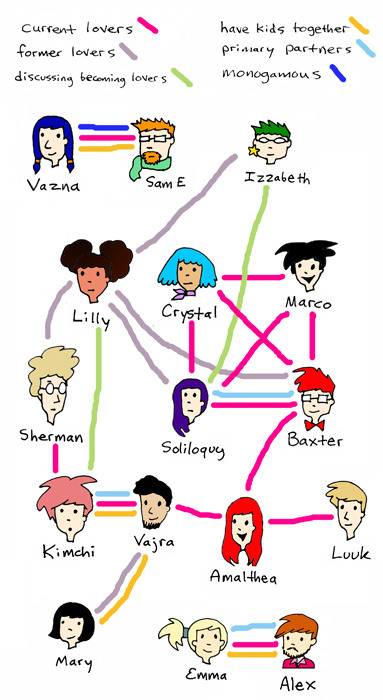Difference between revisions of "Polycule"
m |
|||
| Line 1: | Line 1: | ||
A '''polycule''' is a group connected by (usually romantic and/or [[Non-monogamy | non-monogamous]]) relationships. The word is made up of [https://en.wikipedia.org/wiki/Polyamory polyamory] and [https://en.wikipedia.org/wiki/Molecule molecule], which symbolises that the individuals who share connections in a polycule are like atoms. The visual imagery of atoms is also symbolic of the possibility to change and adapt over time, as molecules and groups of people tend to do. They can consist of many different [[Relationship structure | relationship structures]] like [[vee | vees]] or [[quad | quads]] and are often used in [[kitchen table polyamory]]. | A '''polycule''' is a group connected by (usually romantic and/or [[Non-monogamy | non-monogamous]]) relationships. The word is made up of [https://en.wikipedia.org/wiki/Polyamory polyamory] and [https://en.wikipedia.org/wiki/Molecule molecule], which symbolises that the individuals who share connections in a polycule are like atoms. The visual imagery of atoms is also symbolic of the possibility to change and adapt over time, as molecules and groups of people tend to do. They can consist of many different [[Relationship structure | relationship structures]] like [[vee | vees]] or [[quad | quads]] and are often used in [[kitchen table polyamory]]. | ||
| − | The term '''polycule''' can be traced online back to 2007.<ref>[https://www.dictionary.com/e/gender-sexuality/polycule/|''dictionary.com''], (2019)</ref>In 2018 it received mainstream media attention through Playboy magazine in an interview with actor Ezra Miller.<ref>Ryan Gajewski, [https://www.playboy.com/read/ezra-miller-fantastic-beasts-interview| ''Poly, pain, pleasure & the Potter universe: The ‘Fantastic Beasts’ star dons Bunny ears & goes deep''], ([https://www.playboy.com/| Playboy], November 2018)</ref> | + | The term '''polycule''' can be traced online back to 2007.<ref>[https://www.dictionary.com/e/gender-sexuality/polycule/|''dictionary.com''], (2019)</ref> In 2018 it received mainstream media attention through Playboy magazine in an interview with actor Ezra Miller.<ref>Ryan Gajewski, [https://www.playboy.com/read/ezra-miller-fantastic-beasts-interview| ''Poly, pain, pleasure & the Potter universe: The ‘Fantastic Beasts’ star dons Bunny ears & goes deep''], ([https://www.playboy.com/| Playboy], November 2018)</ref> |
'''Poycules''' are often visualized by people to explain their relationships. Here is an example by artist [https://www.tikvawolf.com/| Tikva Wolf]: | '''Poycules''' are often visualized by people to explain their relationships. Here is an example by artist [https://www.tikvawolf.com/| Tikva Wolf]: | ||
Latest revision as of 09:01, 15 May 2021
A polycule is a group connected by (usually romantic and/or non-monogamous) relationships. The word is made up of polyamory and molecule, which symbolises that the individuals who share connections in a polycule are like atoms. The visual imagery of atoms is also symbolic of the possibility to change and adapt over time, as molecules and groups of people tend to do. They can consist of many different relationship structures like vees or quads and are often used in kitchen table polyamory.
The term polycule can be traced online back to 2007.[1] In 2018 it received mainstream media attention through Playboy magazine in an interview with actor Ezra Miller.[2]
Poycules are often visualized by people to explain their relationships. Here is an example by artist Tikva Wolf:

Notes[edit]
- ↑ dictionary.com, (2019)
- ↑ Ryan Gajewski, Poly, pain, pleasure & the Potter universe: The ‘Fantastic Beasts’ star dons Bunny ears & goes deep, (Playboy, November 2018)
- ↑ Polycule, (Tikva Wolf, August 2013)